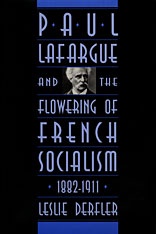

Paul Lafargue, the disciple and son-in-law of Karl Marx, helped to found the first French Marxist party in 1882. Over the next three decades, he served as the chief theoretician and propagandist for Marxism in France. During these years, which ended with the dramatic suicides of Lafargue and his wife, French socialism, and the Marxist party within it, became a significant political force.
In an earlier volume, Paul Lafargue and the Founding of French Marxism, 1842-1882, Leslie Derfler emphasized family identity and the origin of French Marxism. Here, he explores Lafargue's political strategies, specifically his break with party co-founder Jules Guesde in the Boulanger and Dreyfus episodes and over the question of socialist-syndicalist relations. Derfler shows Lafargue's importance as both political activist and theorist. He describes Lafargue's role in the formulation of such strategies as the promotion of a Second Workingmen's International, the pursuit of reform within the framework of the existent state but opposition to any socialist participation in nonsocialist governments, and the subordination of trade unionism to political action. He emphasizes Lafargue's pioneering efforts to apply Marxist methods of analysis to questions of anthropology, aesthetics, and literary criticism.
Despite the crucial part they played in the social and political changes of the past century and the heritage they left, the first French Marxists are not widely known, especially in the English-speaking world. This important critical biography of Lafargue, the most audacious of their much maligned theorists, enables us to trace the options open to Marxist socialism as well as its development during a critical period of transition.

Paul Lafargue, disciple and son-in-law of Karl Marx, was among the most important persons giving organized political expression to Marxism in France. He helped found both the first French collectivist party and the first French Marxist party. He was the first Marxist to sit in the French legislature and for three decades served as the chief theoretician and propagandist for Marxism in France. With his wife, Laura, he translated the Communist Manifesto and other works, introducing and applying Marxist thought in France.
Demonstrating an almost seamless web between intellectual and family history, Leslie Derfler relates ideas and family identity in this account of the first forty years of Paul Lafargue’s life. Lafargue, like his famous father-in-law, called for ideological purity and demanded total hostility to anarchists and reformists. He insisted on economic determinism, the primacy of the concept of the class struggle, and the theory of surplus value. But he made his own contributions as well, particularly in his insistence on rejecting the domination of bourgeois values. Lafargue’s most famous pamphlet, The Right To Be Lazy, showed the advantages that labor could derive by rejecting the bourgeois work ethic. An intellectual of power, he pioneered in the application of Marxist methods of analysis to questions of anthropology, aesthetics, and literary criticism.
Born in Cuba of mixed racial descent, Lafargue joined in demonstrations as a medical student in Paris in the 1860s and was forced into exile. Resuming his studies in London, he became a fixture in the Marx household until he married Laura Marx and moved to Paris. There he worked to expand the influence of the International Workingmen’s Association, but fled to Spain following the general repression after the fall of the Paris Commune. He continued his efforts on behalf of Marxism in Spain and then for ten years in London before returning to France, where he helped to found the new Marxist Parti Ouvrier Français, in 1882.
READERS
Browse our collection.
PUBLISHERS
See BiblioVault's publisher services.
STUDENT SERVICES
Files for college accessibility offices.
UChicago Accessibility Resources
home | accessibility | search | about | contact us
BiblioVault ® 2001 - 2024
The University of Chicago Press









